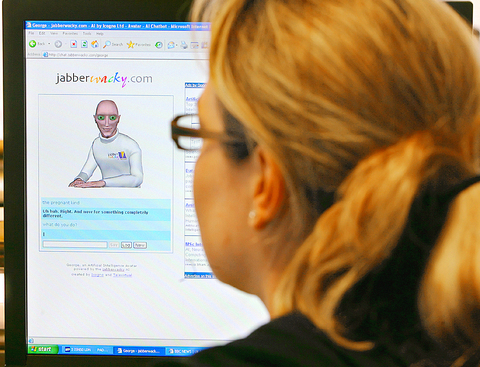Her name is Joan; she is just a few years old and very talkative, and now she is officially the world's most human computer program.
Last Sunday, the computer-generated character scooped the prestigious Loebner prize for artificial intelligence, seeing off some of the world's most hi-tech creations in the process.
Joan's maker, the British entrepreneur Rollo Carpenter, emerged victorious after a day of intense competition as a quartet of software experts attempted to pass the famous "Turing test" and scoop a purse of US$100,000 in the process.

PHOTO: AFP
The test began well before computers were capable of such complex interaction. In 1950 the British mathematician Alan Turing, who famously helped crack German military codes during the second world war, asked how scientists would determine whether computers had successfully achieved truly artificial intelligence. His suggestion was that a computer that could give conversational responses that were indistinguishable from a human's could be said to be thinking for itself.
That challenge turned into an annual competition when New York philanthropist Hugh Loebner offered US$100,000 to the first program to successfully fool a panel of judges into thinking it was a real person.
Despite 16 years of trying, no technology has made that breakthrough, and the grand prize remains unclaimed. However, Joan was deemed to be the most human competitor on show after a blind test held at University College in London. The judges held typed conversations -- similar to an internet chat program -- with all of the challengers, before they declared her the winner.
That victory earned Carpenter a US$2,000 prize and a bronze medal -- and also helped him retain the title he first won last year with George, another program driven by Jabberwacky, the technology behind Joan.
What's unusual about Jabberwacky is that it uses its experience of interaction with humans to create a store from which to draw its next response. The system has been entered for the Loebner Prize contest since 2003, and now seems to be building up an impressive lead over its rivals. That may be helped by the fact that it is always able to enlarge its database through conversations online: if you want to try it out, go to jabberwacky.com.
"I'm very pleased," said Carpenter. "In a way this is very subjective test... but I believe that for practical purposes, people in working conditions will believe it's a human."
Carpenter is now working with call center companies to help train his robots into understanding how to better interact with humans -- with the possibility of using them to replace human workers in the near future. But experts say that a program that will successfully pass the Turing test is still some years away.
"We're still a long way off, but I think he's onto something," said Duncan Graham-Rowe, one of the judges.
But Carpenter is used to the long haul. The very first version of the program was written in 1982.

‘ABUSE OF POWER’: Lee Chun-yi allegedly used a Control Yuan vehicle to transport his dog to a pet grooming salon and take his wife to restaurants, media reports said Control Yuan Secretary-General Lee Chun-yi (李俊俋) resigned on Sunday night, admitting that he had misused a government vehicle, as reported by the media. Control Yuan Vice President Lee Hung-chun (李鴻鈞) yesterday apologized to the public over the issue. The watchdog body would follow up on similar accusations made by the Chinese Nationalist Party (KMT) and would investigate the alleged misuse of government vehicles by three other Control Yuan members: Su Li-chiung (蘇麗瓊), Lin Yu-jung (林郁容) and Wang Jung-chang (王榮璋), Lee Hung-chun said. Lee Chun-yi in a statement apologized for using a Control Yuan vehicle to transport his dog to a

Taiwan yesterday denied Chinese allegations that its military was behind a cyberattack on a technology company in Guangzhou, after city authorities issued warrants for 20 suspects. The Guangzhou Municipal Public Security Bureau earlier yesterday issued warrants for 20 people it identified as members of the Information, Communications and Electronic Force Command (ICEFCOM). The bureau alleged they were behind a May 20 cyberattack targeting the backend system of a self-service facility at the company. “ICEFCOM, under Taiwan’s ruling Democratic Progressive Party, directed the illegal attack,” the warrant says. The bureau placed a bounty of 10,000 yuan (US$1,392) on each of the 20 people named in

The High Court yesterday found a New Taipei City woman guilty of charges related to helping Beijing secure surrender agreements from military service members. Lee Huei-hsin (李慧馨) was sentenced to six years and eight months in prison for breaching the National Security Act (國家安全法), making illegal compacts with government employees and bribery, the court said. The verdict is final. Lee, the manager of a temple in the city’s Lujhou District (蘆洲), was accused of arranging for eight service members to make surrender pledges to the Chinese People’s Liberation Army in exchange for money, the court said. The pledges, which required them to provide identification

INDO-PACIFIC REGION: Royal Navy ships exercise the right of freedom of navigation, including in the Taiwan Strait and South China Sea, the UK’s Tony Radakin told a summit Freedom of navigation in the Indo-Pacific region is as important as it is in the English Channel, British Chief of the Defence Staff Admiral Tony Radakin said at a summit in Singapore on Saturday. The remark came as the British Royal Navy’s flagship aircraft carrier, the HMS Prince of Wales, is on an eight-month deployment to the Indo-Pacific region as head of an international carrier strike group. “Upholding the UN Convention on the Law of the Sea, and with it, the principles of the freedom of navigation, in this part of the world matters to us just as it matters in the